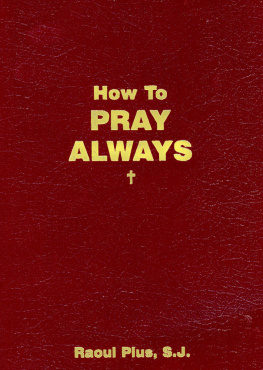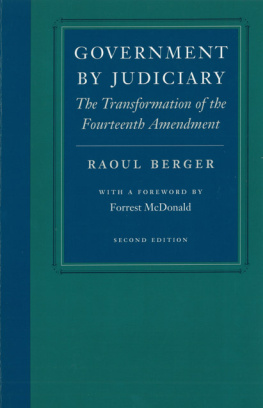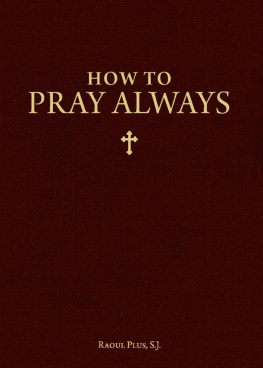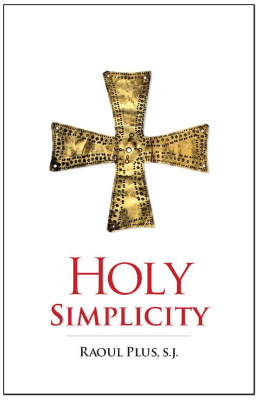Also by Raoul Plus from Sophia Institute Press:
How to Pray Always Winning Souls for Christ
Raoul Plus, S.J.




To Mary, Queen of Saints Editor's note: The biblical quotations in the following pages are taken from the Douay-Rheims edition of the Old and New Testaments. Where applicable, quotations have been cross-referenced with the differing names and enumeration in the Revised Standard Version, using the following symbol: (RSV =).
ix
Part One
Strive to overcome your self
.............. 5
......... 15
...... 23
......... 33
............. 41
Part Two
Develop a spirit of prayer
........ 49
......... 99
Adversity, which easily discourages weak souls, strangely enough incites strong souls to greater perfection. They understand that troublesome times, even more than peaceful times, demand the complete gift of self. It is to help courageous souls that these pages are written. The thought is not new, but a deeper penetration of it may be helpful.
We need saints now more than ever before!
But how does one become a saint?
There are but two means, and both are essential: to be willing to consider self as nothing, to practice a life of complete generosity in which all is for God without any reservation or let-down; and to strive for intimate union with God, for recollection or the spirit of prayer - a life of prayer insofar as circumstances and the duties of one's state permit.
There are only two mountains in the world: Thabor and Calvary. On Thabor we pray in secret, heart-to-heart with God, and unite ourselves with His infinite Majesty. Thabor's prayer, however, is not necessarily one of ecstatic joy; for our sanctification is difficult, and often enough it is only the hard road of Calvary that brings us to Thabor. On Calvary we suffer with Christ crucified, but our divine Savior, ever eager to reward those who follow Him that far, will often transform our Calvary for some days, or at least for a few hours, into Thabor.
When our Lord has found enough generous souls to whom this program is not a hard saying, but rather an inspiring challenge impelling them to accept both its immediate difficulties and threatening hardships, you may be sure that through them, or at least because of them, He will complete the work of redemption.
Administrators, politicians, and those charged with governing our temporal welfare must do their best. Their effort alone, however, will not raise the world's ruins and restore life to the world. If the work of reconstruction is to be fruitful and effective, we must have devout souls who are willing to consecrate themselves to a deeply spiritual life.
We face a challenge!
Christ awaits our answer!
Let it be understood: God has no place for triflers or merely curious onlookers. The redemption of the world is no trifling matter. The world is bought at a great price!
We do not all have the same talent to offer. God asks much of those who have much, but from the less gifted He is content with the widow's mite; this meager offering is by no means less valuable or less effective. Each one must give his all, and this all varies greatly in quantity and quality. The duty to win back the world does not devolve upon religious alone, even though the demands made upon them are naturally greater. The field is open in the world to the married or single, the youth, the mature, and the old.
Everyone is invited. No one is excluded.

Either we have or have not committed grave sins. Whatever the case may be, the necessity for self-conquest confronts us.
Even though we have never sinned grievously, the fact still remains that we entered life burdened with Original Sin and its consequent evil tendencies arising from the triple concupiscence: concupiscence of the eyes, concupiscence of the flesh, and concupiscence of the mind. The Blessed Virgin Mary alone, through her Immaculate Conception, was preserved from this taint and, as the Holy Church teaches, was given in addition to her fundamental preservation the precious grace to keep free of actual sin throughout her life.
These formal definitions of the Church bring us to the double realization that from our birth we have within us a tendency that, if not guarded against, leads to catastrophe; and further, that at no moment are we free from a possible head-on collision with temptation. Who can be certain that his moral brakes will not play him false sometime or another? Like autos with defective brakes on a difficult road, we need to be on our guard for every turn or slightest grade.
Someone has said that civilization does not consist in gas, electricity, railroads, and airplanes, but in organization and struggle against Original Sin. The truth of that statement is plainly evident.
"Man is not good by nature," observed Jacques Riviere. "His nurse knows that." And again he says, "The dogma of Original Sin is a fundamental consideration for a sane and truly just estimate of man."
In the light of this truth, how absurd and presumptuous is Rousseau's theory that man is totally good and in consequence has nothing to fear from himself. This ridiculous theory, however, has been sufficiently exploded. How grateful we should be to the Church for giving us a true conception of our human nature!
But without accepting the fundamental axioms of a deceptive and confusing secularism, do we not reason, in practice at least, as if an evil concupiscence did not exist and as if we had not to fear its possible treachery?



















